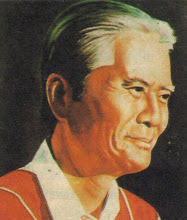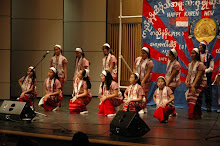US President Bush spelled out a series of bilateral successes with Asian countries based on core American values and perceptions of security and prosperity. His emphasis on bilateralism over regionalism and multilateralism will be his principal legacy for future US engagement in Asia.
What was included in President George W Bush's major foreign policy speech in Bangkok was as important as that which was omitted. His overarching paradigm of freedom, prosperity and security and what he saw as the overall achievements of his two terms in office were unsurprising. But the good news for Mr Bush's successor is that the outgoing president's approach towards Asia leaves much room for manoeuvre, much space in which to operate.
With a wide array of Asian countries to choose from in delivering his remarks prior to his final destination of the Beijing Olympics, Mr Bush's choice of stopovers in Seoul and Bangkok were symbolic and testimony to America's longstanding priorities in Asia. South Korea and Thailand, two formal treaty partners of the United States, have formed linchpins in Washington's engagement with the region since World War Two.
The Korean War was a watershed in the 1950s during the Cold War. Its unfinished business over Korean reunification and the ongoing de-nuclearisation of North Korea remains a thorny issue and the main focus of Mr Bush's dealings with East Asia.
That Thailand was picked for the second leg of the overseas visit and venue for the major policy recap of the Bush years, is equally significant.
Thai-US relations have just reached a milestone of 175 years, the oldest relationship in these parts. Bangkok's anti-communist support during the Cold War never wavered. Thailand is not just a treaty partner but a major non-Nato ally. It struggled through a coup period and has returned to democratic rule. Mr Bush acknowledged this point but skipped the contested nature of Thai democracy, its prolonged crisis and stalemate.
Thailand's geography also made sense for Mr Bush's second Asia policy focus on Burma. Yet the president's brief reference to Burma's military regime and repression was surprisingly light. A full-blown castigation of the Burmese generals could have caused considerable discomfort for Bangkok, which has just assumed the chair of Asean, which includes Burma. As a next-door neighbour to Burma, Thailand risked tensions with the State Peace and Development Council if it allowed Mr Bush a springboard to castigate the Burmese generals.
Instead, Mr Bush and his wife used less official venues to make their points, featuring his lunch with leading Burmese dissidents and her high-profile visit to a refugee camp on the Thai-Burmese border. The cause of Burma's freedom, democracy and human rights was poignantly served but whether Mr Bush and his wife's gestures will make any difference on the ground is doubtful.
Under Mr Bush's watch, Washington's sanctions upon sanctions on Burma's military junta have been frustrated and overcome by the generals, and may have been counter-productive and detrimental in their unintended effect of exacerbating the people's hardship.
What Mr Bush skipped was the roles of India, China and Asean in effectively allowing the SPDC to go on. Mr Bush's successor will have ample opportunities to rebalance Washington's Burma policy to combine selective engagement with increased leverage on the big players in Burma's neighbourhood.
What Mr Bush highlighted as his accomplishments - alliance formation and reinforcement, pursuit of values such as freedom and democracy, Asia-Pacific growth and prosperity, and concerted efforts to "confront challenges", is an updated version of the Bush Doctrine, minus the primacy of security and the concept of pre-emption back in vogue in the wake of the Sept 11 terrorist attacks in New York and Washington.
But here is where Mr Bush's omission is the most glaring. The war on terror, particularly in Iraq and to a lesser extent in Afghanistan, has been a grand US misadventure. It was misguided, and has failed for all intents and purposes. It has sapped the energy and resources which could have gone into what Mr Bush considers his success in Asia.
China was the third primary focus. Mr Bush was measured in his assessment, citing Beijing's role in the six-party talks on North Korea's nuclear disarmament and the maintenance of cross-straits status quo i.e. neither Chinese takeover of the island nation nor Taiwanese declaration of independence. But Beijing was naturally chastised for its lack of freedom and human and religious rights. The more critical comments on China were best said in Bangkok, before the president arrives in Beijing.
The thrust of Mr Bush's remarks spelled out a series of bilateral successes with Asian countries based on core American values and perceptions of security and prosperity. Mr Bush's emphasis on bilateralism over regionalism and multilateralism will be his principal legacy for future US engagement in Asia.
The new administration from next January will have to ponder whether a broader conceptualisation of engaging Asia as a region by signing Asean's Treaty of Amity and Cooperation and joining the inchoate regional architecture such as the Asean Plus Three, East Asian Community-building, and East Asia Summit, is in America's greater interest. The events of Sept 11 were Mr Bush's misfortune as they have subsequently defined his rule.
The next president will have more latitude to refashion US foreign policy in Asia with less of the baggage from the war on terror. He should see Asia as much more than just North Korea in the northeast and Burma in the southeast. In view of China's rise and nuanced handling of Asia, it behooves Washington to engage the region as an integrated partner, not on a bilateral basis but as a major architect of Asian regionalism.
By Thitinan Pongsudhirak, Director of the Institute of Security and International Studies, Faculty of Political Science, Chulalongkorn University
Friday, August 8, 2008
Analysis: Asia after Bush
Subscribe to:
Post Comments (Atom)










No comments:
Post a Comment